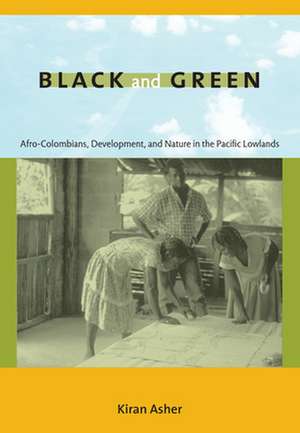Black and Green – Afro–Colombians, Development, and Nature in the Pacific Lowlands
Autor Kiran Asheren Limba Engleză Paperback – 9 aug 2009
Preț: 261.38 lei
Nou
Puncte Express: 392
Preț estimativ în valută:
50.03€ • 52.03$ • 41.92£
50.03€ • 52.03$ • 41.92£
Carte tipărită la comandă
Livrare economică 14-28 martie
Preluare comenzi: 021 569.72.76
Specificații
ISBN-13: 9780822344834
ISBN-10: 0822344831
Pagini: 272
Ilustrații: 15 illustrations
Dimensiuni: 186 x 227 x 19 mm
Greutate: 0.39 kg
Editura: MD – Duke University Press
Locul publicării:United States
ISBN-10: 0822344831
Pagini: 272
Ilustrații: 15 illustrations
Dimensiuni: 186 x 227 x 19 mm
Greutate: 0.39 kg
Editura: MD – Duke University Press
Locul publicării:United States
Cuprins
Table of Contents; Abbreviations and AcronymsIntroduction: Black Social Movements and Development in the Making; 1: Afro-Colombian Ethnicity: From Invisibility to the Limelight; 2: The El Dorado of Modern Times: Economy, Ecology, and Territory; 3: El Ruido Interno de Comunidades Negras: The Ethno-Cultural Politics of the PCN; 4: Seeing with the Eyes of Black Women: Gender, Ethnicity, and Development; 5: Displacement, Development, and Afro-Colombian MovementsAppendices; A. Transitory Article 55; B. Law 70 of 1993: Outline and Salient Features; Notes; References; Index
Recenzii
Kiran Asher effectively captures the nuances of the multiple positions taken by Afrocolombians and their allies regarding the development of the Pacific lowlandsethno-cultural activists, mainstream politicians, black womens networks, nongovernmental organizations, and social scientistsproducing an intricate and multifaceted vision of the heterogeneous interests at play in the creation of the black movement in Colombia. Ashers keen ethnographic eye explores the contradictions that emerge when local demands are translated into transnational discourses of identity, rights, environmentalism, and community development. She lays bare the complex texture of the negotiations that gave rise to legislation and planning, on the one hand, and of the voicing of local hopes and aspirationsparticularly of Afrocolombian womenon the other. She moves with ease between the halls of the Colombian Senate and the workshop of a womens cooperative, revealing the numerous levels at which Afrocolombian environmental discourse emerges. In the process, Asher crafts a sensitive and sympathetic, yet also sharp-edged and daring portrait of a significant social movement that is coming to the fore across Latin America. Joanne Rappaport, author of Intercultural Utopias: Public Intellectuals, Cultural Experimentation, and Ethnic Pluralism in ColombiaKiran Asher provides the best exploration we have of Afro-Colombians experiences in the wake of an unprecedented 1991 constitutional clause recognizing collective land rights for black communities. Across the disciplines, students of racial politics and environmental organizing will benefit from her thoughtful analysis and the clarity of her approach.Ann Farnsworth-Alvear, author of Dulcinea in the Factory: Myths, Morals, Men, and Women in Colombias Industrial Experiment, 19051960
Notă biografică
Kiran Asher is Associate Professor of International Development & Social Change and Women's Studies at Clark University.
Textul de pe ultima copertă
"Kiran Asher provides the best exploration we have of Afro-Colombians' experiences in the wake of an unprecedented 1991 constitutional clause recognizing collective land rights for black communities. Across the disciplines, students of racial politics and environmental organizing will benefit from her thoughtful analysis and the clarity of her approach."--Ann Farnsworth-Alvear, author of "Dulcinea in the Factory: Myths, Morals, Men, and Women in Colombia's Industrial Experiment, 1905-1960"
Descriere
Looks at how Afro-Colombian communities use state resources to try to shape the state and development
